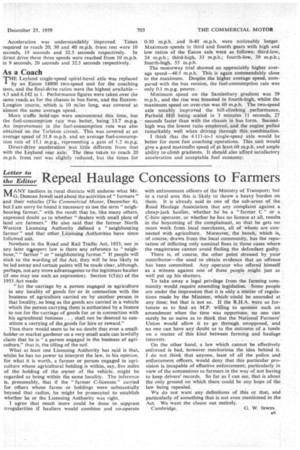Letter to
Page 43

If you've noticed an error in this article please click here to report it so we can fix it.
the Editor Repeal Haulage Concessions to Farmers MANY hauliers in rural districts will endorse what Mr. G. Duncan Jewell said about the activities of" farmers" and their vehicles (The Commercial Motor, December 4), but I am sorry he found it necessary to use the term "neighbouring farmer," with the result that he, like many others, expressed doubt as to whether "dealers with small plots of land are farmers." He also said that the former North Western Licensing Authority defined a "neighbouring farmer" and that other Licensing Authorities have since
followed suit. .
Nowhere in the Road and Rail Traffic Act, 1933, nor, in any later tronsport law is there any reference to "neighbour," " farmer " or "neighbouring farmer." If people will stick to the wording of the Act, they will be less likely to be led astray and certain points will be made clear, although, perhaps, not any more advantageous to the legitimate haulier (if one may use such an expression). Section 1(5)(c) of the 1933 Act reads: " (e) the carriage by a person engaged in agriculture in any locality of goods for or in connection with the business of agriculture carried on by another person in that locality, so long as the goods are carried in a vehicle which the person carrying them is authorized by a licence to use for the carriage of goods for or in connection with his agricultural business . . shall not be deemed to constitute a carrying of the,goods for hire or reward."
Thus there would seem to be no doubt that even a smallholder or market gardener on a very small scale can lawfully claim that he is "a person engaged in the business of agriculture," that is, the tilling of the soil.
What at least one Licensing Authority has said is that, whilst he .has no power to interpret the law, in his opinion, for what it is worth, a farmer or person engaged in agriculture whose agricultural holding is within, say,. five miles of the holding of the owner of the vehicle, might be regarded as being within the same locality. The inference is, presumably, that if the "farmer C-licensee " carried for others whose farms or holdings were substantially beyond that radius, he might be prosecuted to establish whether he or the Licensing Authority was right..
I agree that much more could he done to suppress irregularities if hauliers would combine and co-operate
with enforcement officers of the Ministry of Transport; but in a rural area this is likely to throw a heavy burden on them. It is already said in one of the sub-areas of the Road Haulage Association that any complaint against a cheap-jack haulier, whether he be a "farmer C" or a C-hire operator, or whether he has no licence at all, results in the boycotting of the complainant, so that he gets no more work from local merchants, all of whom are connected with agriculture. Moreover, the bench, which is, of cOurse, drawn from the local community, has the reputation of inflicting only nominal fines in those cases where the magistrates cannot avoid finding the defendant guilty.
There is, of course, the other point stressed by your contributor—the need to obtain evidence that an offence has been committed. Any operator who offered himself as a witness against one of these people might just as well put up his shutters.
To take away a legal privilege from the farming community would. require amending legislation. Sortie people are under the impression that it is only a matter of regulations made by the Minister, which -cOuld be amended at anytime; but that is not so. If the R.H.A. were so fortunate as to find an M.P. willing to sponior such an amendment when the time was opportune, no one can surely be so naive as to think that the National Farmers' Union would allow it to go through unopposed, and no one can have any doubt as to the outcome of a tussle on a matter of this kind between farming and haulage interests.
On the other hand, a law which cannot be effectively enforced is bad, however meritorious the idea behind it. I do not think that anyone, least of all the police and enforcement officers, would deny that this particular provision is incapable of effective enforcement; particularly in view of the concessions to farmers in the way of not having to keep drivers' records. So far as I can see, that is about the only ground on which there could be any hope of the law being repealed.
We do not Want any definitions of this or that, and particularly of something that is not even mentioned in the Act. We want the clause out entirely.
Cambridge. G. W. Timm.
















































































